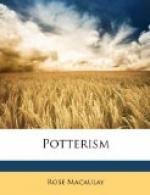I sat up till midnight, wondering how on earth I was going to put it to Arthur.
7
I didn’t dine with Arthur. I thought it would last too long, and that he might want me to go, and that I should certainly want to go, after I had said what I had to say. So I rang him up at the office and asked if he could lunch. Not at the club; it’s too full of people we know, who keep interrupting, and who would be tremendously edified at catching murmurs about libel and murder and Lady Pinkerton being poisoned. So I said the Temple Bar restaurant in Fleet Street, a disagreeable place, but so noisy and crowded that you can say what you like unheard—unheard very often by the person you are addressing, and certainly by every one else.
We sat downstairs, at a table at the back, and there I told him, in what hardly needed to be an undertone, of the rumours that were being circulated about him. I felt like a horrid woman in a village who repeats spiteful gossip and says, ’I’m telling you because I think you ought to know what’s being said.’ As a matter of fact, this was the one and only case I have ever come across in which I have thought the person concerned ought to know what was being said. As a rule, it seems the last thing they ought to know.
He listened, staring at the tablecloth and crumbling his bread.
‘Thank you,’ he said, ’for telling me. As a matter of fact, I knew. Or, anyhow, guessed.... But I’m not sure that anything can be done to stop it.’
‘Unless,’ I said, looking away from him, ’you could find grounds for a libel action. You might ask a lawyer.’
‘No,’ he returned quickly. ’That’s quite impossible. Out of the question.... There are no grounds. And I wouldn’t if there were. I’m not going to have the thing made a show of in the courts. It’s exactly what the Pinkertons would enjoy—a first-class Pinkerton scoop. No, I shall let it alone.’
‘Is there no way of stopping it, then?’ I asked.
‘Only one,’ he murmured, absently, beneath his breath, then caught himself up. ‘I don’t know. I think not.’
I didn’t make any further suggestions. What was the good of advising him to remonstrate with the Pinkertons? If they were lying, it was the obvious course. If they weren’t, it was an impossible one. I let it alone.
Arthur was frowning as he ate cold beef.
‘There’s one thing,’ he said. ’Does Jane know what is being said? Do you suppose her parents have talked about it to her?’
I said I didn’t know, and he went on frowning. Then he murdered a wasp with his knife—a horrible habit at meals, but one practised by many returned soldiers, who kill all too readily. I suppose after killing all those Germans, and possibly Oliver Hobart, a wasp seems nothing.
‘Well,’ he said absently, when he was through with the wasp, ’I don’t know. I don’t know,’ and he seemed, somehow, helpless and desperate, as if he had come to the end of his tether.




